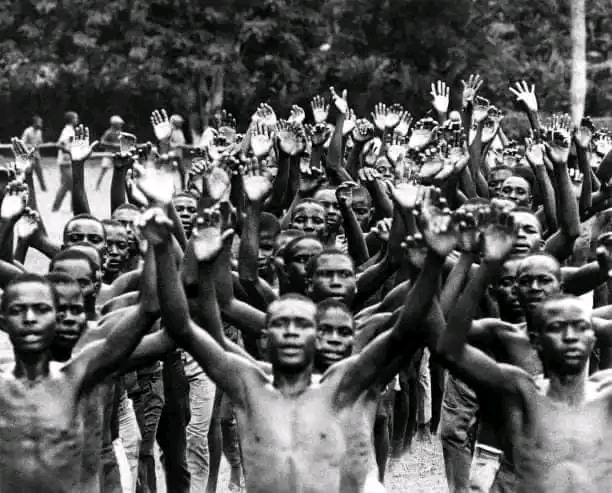THE BIAFRA WAR:A NATION IN SORROW.

The Nigerian-Biafran War, also known as the Biafran War, was a brutal and devastating conflict that lasted from 1967 to 1970. It was a civil war fought between the government of Nigeria and the secessionist state of Biafra, which was comprised mainly of the Igbo people.
Background
The roots of the conflict date back to Nigeria’s independence from British colonial rule in 1960. The country was divided into three main regions: the Hausa-Fulani-dominated North, the Yoruba-dominated West, and the Igbo-dominated East. Tensions between these regions simmered for years, fueled by ethnic and economic differences.
The Spark
In January 1966, a group of Igbo army officers staged a coup, overthrowing the government of Prime Minister Abubakar Tafawa Balewa. The coup leaders, led by Major Chukwuemeka Odumegwu Ojukwu, cited corruption and regional inequality as motivations. However, the coup was perceived as an Igbo power grab, leading to widespread anti-Igbo violence in the North.
Secession and War
In May 1967, Ojukwu, now the Military Governor of the Eastern Region, declared the region an independent state, Biafra. The Nigerian government, led by General Yakubu Gowon, refused to recognize Biafra and launched a military campaign to reclaim the secessionist territory.
Harrowing Experiences
- Massacres and Genocide: Thousands of Igbos were killed in the North, leading to a massive refugee crisis. The Nigerian military also committed atrocities, including massacres, rapes, and destruction of villages.
- Starvation and Malnutrition: The Nigerian government blockaded Biafra, cutting off food and medical supplies. This led to widespread starvation, malnutrition, and related diseases. Estimates suggest up to 2 million civilians died from starvation alone.
- Displacement and Refugees: Millions were forced to flee their homes, creating one of the largest refugee crises in African history.
- Child Soldiers: Many children were conscripted into the Biafran army, exposing them to the harsh realities of war.
- Airstrikes and Bombardment: Nigerian forces bombed Biafran cities, markets, and hospitals, causing immense civilian casualties.
- Ethnic Cleansing: The conflict took on an ethnic dimension, with targeted killings and persecution of Igbos and other minority groups.
Key Events
- The Asaba Massacre(October 1967): Nigerian troops killed hundreds of Igbo civilians in Asaba.
- The Ahiara Declaration(June 1967): Ojukwu outlined Biafra’s goals and philosophy.
- Operation Tiger Jump(1968): Nigerian forces captured key Biafran cities, including Enugu.
- The Abagana Ambush (March 1968): Biafran forces killed hundreds of Nigerian soldiers.
However,there were many undocumented stories told to us by veterans who were in the battlefield.For instance,,the Iwuru Massacre in present day Biase local government area of Cross River State was some time ago related by my Secondary school English Language teacher,Dr Samuel Eno in an article.
Aftermath
The war ended on January 15, 1970, with Biafra’s surrender. The conflict resulted in:
- Estimates of 1-3 million deaths, mostly from starvation and disease.
- Mass displacement and refugeDestruction of infrastructure and economy
- Lasting ethnic tensions and divisions.
Reconciliation
Post-war efforts aimed at reconciliation and reconstruction:
- General Amnesty(1970): Gowon granted amnesty to Biafran leaders and soldiers.
- Reconstruction and Rehabilitation: Efforts focused on rebuilding infrastructure and reintegrating refugees.
- National Reconciliation (1970s-1980s): Initiatives promoted unity and healing.
My mom once told me of a sad incident during the war,as they went to take refuge at the Kezidom shrine in Idomi.There was behold a heavy downpour that night and most of their belongings were lost to flood and they were drained as animals.This could be be imagined than told.
A story was told in Ugep, Yakurr Local Government Area of the first ever public view of the war in cinema.The story was that of fury and rage as many cried home especially those that lost their loved ones in that cruesome war.After that event there was never any repeat of such.
